Squeeze filters, straw filters, and pump filters are all effective at making murky water clear, but they all need the use of your hands and consume your valuable time. Gravity filters, on the other hand, provide a practical hands-free solution.
Rather than forcing water through a filter, a gravity system allows gravity to perform the work of drawing water down from a hanging reservoir, through a water filter, and into a waiting receptacle.
We like the freedom gravity filters provide us to do other things while gravity takes care of water filtration, so we started shopping for the best ones to bring with us when we need sanitary water. We learned a lot during our testing, and we’ve gathered it all into the seven reviews below. After reading them, perhaps you’ll know just the right gravity filter to add to your gear configuration.
Most of us are aware that “clean” drinking water is not always as pure as it appears. The EPA regulates over 80 contaminants that pose a health concern – but these chemicals, metals, and plastics can lawfully be present in trace amounts in our water.
Furthermore, many new pollutants are not controlled at all. If you’re thinking about using a gravity filter to purify your water, I’m here to assist you choose the ideal system for your needs.
With 100,000 monthly readers and pieces published in publications such as WQP Magazine and Sawyer Products, I make water filtration my business.
There are many different types of gravity filters available, but I concentrated my testing on the best gravity water filters that had proven to be the most popular with consumers this year. You’ll discover a mix of countertop and hanging gravity filters, all of which have been thoroughly researched and tested by me.
Best Gravity Fed Water Filter System Reviews in 2022
1. Big Berkey Gravity-Fed Water Filter
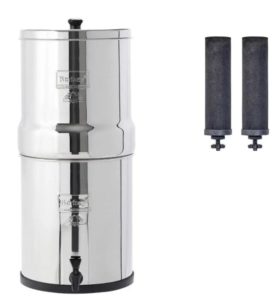
The Big Berkey is a popular countertop gravity fed water filter on the market today. While it is slightly more expensive than its competitors, you are paying for the brand’s reputation — Big Berkey has a long history of producing high-quality countertop filters.
You can pay a little lower price for the Big Berkey with two filters, known as Black Berkey Elements, or an additional $110 for four filters. While increasing the number of filters in the chamber will not enhance filtering quality, it will speed up the process by doubling the filtration speed and overall lifespan of each gravity fed water filter, which will only have to put in half the effort each time.
The Big Berkey’s Black Berkey filter elements can eliminate a wide range of contaminants in water, including chemicals such as chlorine, pesticides, VOCs, and herbicides; parasites, cysts, viruses, and bacteria; and heavy metals and nitrates such as lead and mercury.
All of this may be accomplished without removing beneficial minerals from water, such as calcium and magnesium. The Big Berkey is a countertop solution that requires no installation or connection to your water supply. Simply lay it on your counter, remove the package, clip the filters in place, and fill it with water.
Maintenance is very simple: simply remove the old Black Berkey filters and clip in the new ones, and rinse out the water tank on a regular basis.
If you’re familiar with counter water filter systems, you’ll know that the Berkey is one of the best. The machine employs “elements,” which are designed to filter and purify water simultaneously. If you want a water filter that removes a wide range of impurities but don’t want to spend the money on a reverse osmosis system, the Big Berkey is an excellent option to explore.
Going back to what I said previously, the Big Berkey does not have the benefit of water pressure on its side. When I compared the system to a faucet water filter, I discovered that the faucet filter produced a considerably faster result (i.e. I had access to instant clean water immediately).
This is because the force of the water running through your pipes forces the water through the filters, allowing it to be filtered faster. Because the Big Berkey uses gravity to filter drinking water, the filtering process will be significantly slower – while this will not hinder the quality of filtration; in fact, gravity filters may frequently afford to be more thorough because of how slowly they function.
As you may expect, you won’t be able to drink clean water right away after loading the Berkey gravity fed water filter system. You could expect the device with two Black Berkey filters to eliminate pollutants in water to take up to three hours.
Having said that, the tank has a good capacity of 2.25 gallons. To put things into perspective, it is advised that one individual drink 0.5 gallon of water every day. My family could fill the top chamber and consume filtered water for just over a day before the chamber needed to be refilled, ensuring that water was always available when we needed it.
2. Propur PROONE BIG+
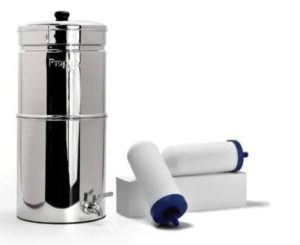
The Propur is a 2.75-gallon countertop gravity filter system with two 7-inch filter elements that comes with it. This filter, which requires no electricity to operate, is suitable for use in all situations, including emergencies.
Herbicides, pesticides, fluoride, chlorine, bacteria, chloramines, medicines, and other chemicals and pollutants are removed from drinking water by its NSF-certified G2.0 filters. To increase taste, healthy minerals such as calcium are left in water.
Even if you use the Propur on a daily basis, the filters are designed to last for 12 months, which is quite impressive for a countertop water filter. They are also loaded with silver, which prevents bacterial development, guaranteeing that they only remove harmful toxins and do not introduce new ones.
The filters are constructed of granular activated carbon, which traps pollutants in the gravity fed water filter medium by adsorption. To prevent leaching, all components in the Propur are BPA-free and food-grade.
Because the Propur is so portable, you may take it camping, to a vacation home, or even to your workplace at work. To get it started, all you need is a countertop. When using the filters for the first time, it is recommended that you discard your first batch of water to remove any aftertaste.
3. Alexapure Pro Stainless Steel Water Filtration System
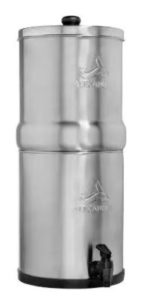
The Alexapure is a stainless steel gravity-fed water filtering system with a 5,000 gallon filter capacity. It removes over 200 pollutants, including germs, lead, viruses, cysts, fluoride, and TCP.
Pour water into the top chamber of the Alexapure, wait for it to filter through to the bottom chamber, and then switch on the dispenser to fill your glass or bottle. Because it does not require energy to function, you may use the Alexapure in any condition, including when the power is out.
The Alexapure can hold up to 8.5 litres (or 2.25 gallons) of water at a time, which is enough to supply water to a typical family. The gravity water filter cartridges themselves are simple to install and do not require priming, which is useful if you want to get your system up and running right away. You can also add three more filters for faster filtration performance.
The Alexapure is meant to last and is low-maintenance to use, thanks to its stainless steel structure. You simply need to remember to replace the filters every 5,000 gallons, or approximately every 12 months. They are made of carbon blocks, and when they need to be replaced, water takes significantly longer to filter through the media. Replacement filters are available from the manufacturer online.
4. Aquapail Gravity-fed Water Filter
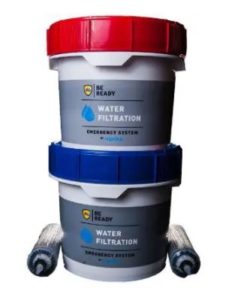
The Aquapail is a gravity water filtering system for outdoor use with a total filter life of 1,100 gallons. The Aquapail, with its sturdy, durable outer cover, is great for carrying on camping vacations or to your vacation home. While it is not the most compact filtering solution, it can be disassembled for transportation and is strong enough to survive all situations.
In an emergency, you may rely on the Aquapail since it not only removes a small number of impurities, but it also removes almost all dangerous contaminants from a water source. It only takes a few minutes to filter out bacteria, viruses, cysts, and heavy metals, ensuring that waterborne organisms are removed and the water is safe to drink.
The Aquapail is suitable for use with well water, stream water, or any other non-saltwater source. Because the system relies just on gravity to filter the water, you do not need to be in a place where you can connect it to your water supply and electricity – all you need is access to water.
The Aquapail is simple to set up; simply put the device together, attach the filters, and you’re ready to go. The Aquapail’s only tiny disadvantage is that its filters have a shorter filter life than other countertop filters, but they work harder than most during that period.
5. Zen Water Systems Countertop
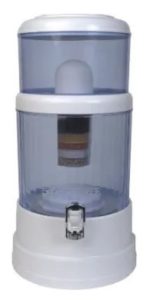
The Zen Water Systems filter is a clear water filtration system that removes bacteria, pollutants, chemicals, and other impurities. At just under $100, this system is an excellent choice for those on a tighter budget – and you won’t get a lower quality for paying less.
The system has five functions and a glass container for measuring how much water you have: it filters, purifies, alkalizes, mineralizes, and preserves drinking water. Because it does not require power or plumbing, it is simple to set up and maintain. Its BPA-free design ensures that no pollutants are introduced into the water after filtering.
When water is introduced into the Zen Water Systems filter, it first travels through a granulated activated carbon filter, which captures pollutants such as chlorine. It then passes through an ionic exchange resin that softens the water and infrared ceramic balls that give the water a more pleasant alkaline taste. Finally, the water is filtered via silica sand and mineral stones, which return vital minerals to the water.
This gravity water filter is unique in that it not only filters pollutants from water, but it also softens it and adds essential minerals. However, it lacks NSF certification, so you’ll have to take the manufacturer’s word for it.
6. Sawyer Gravity
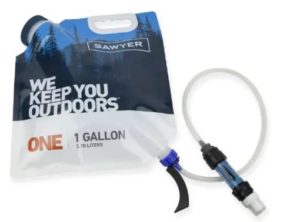
The Sawyer water filter is a 1 gallon gravity filter system that weighs under 2 ounces and has a 0.1 micron inline filter. This hanging water filter is fully portable and very simple to use, making it ideal for trekking, camping, or simply keeping on hand for emergencies.
The Sawyer gravity water filter can be used to fill water bottles, hydration packs, or a plain glass with water. It has been independently tested and found to remove 99.9% of all bacteria and protozoa, including salmonella, E. coli, giardia, and cryptosporidium. You may use the filter anywhere as long as you position it correctly, allowing gravity to do its work.
The device operates by utilizing two bladders: one for “dirty water” and one for “clean water.” When you fill the top bladder with dirty water, it trickles down the tube that separates the two bags, where it is filtered before dripping into the “clean water” bladder.
A word of caution: while the gravity water filters are really good quality, some customers have commented that the bags could have been manufactured a little better, and the connections may leak somewhat.
You may clean and reuse the Sawyer filter cartridge without purchasing a replacement. It’s built to last a long time, and doing a filter backwash will help restore it to 98 percent of its original efficiency when water flow starts to drop.
7. Platypus Gravity Water Filter
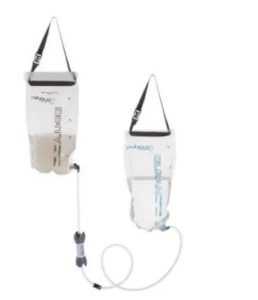
The Platypus is a 4.0 liter hanging gravity filter system that fulfills all NSF criteria for removing 99.9% of bacteria and 99.9% of protozoa, including E. coli, cholera, and salmonella.
The Platypus filter does not require any pumping or other recurring maintenance. Simply hang the system from a tree and fill it with water, then leave it to filter from one bag to the next, ready for drinking, cooking, and cleaning. You can take the Platypus camping or simply keep it in your home for emergency use.
The Platypus’s simplistic design makes it simple to assemble and use. It has two 4-liter reservoirs, one for dirty water and the other for pure, filtered water. A hose connects the reservoirs, and there are a couple of extra handy features such as a shutdown clamp and a storage sack.
A GravityWorks filter, which eliminates bacteria and protozoa and has a lifespan of roughly 1,500 liters, is housed within the Platypus. A GravityWorks carbon element is also included, which contains scents, flavors, and organic chemicals. It should be noted that, despite slightly deceptive advertising, this component is sold separately at an additional cost.
8. LifeStraw Flex Advanced Water Filter with Gravity Bag
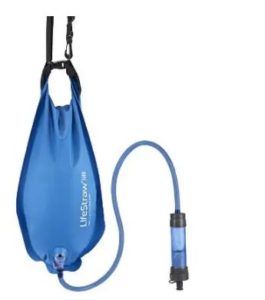
The LifeStraw hanging gravity filter captures 99.9% of dangerous germs, protozoa, and microplastics. This gravity filter satisfies NSF Standard 53 for lead and other heavy metal reduction, with a carbon filter capsule that improves water taste and reduces lead, chlorine, and other pollutants – however it does not appear to be NSF certified, merely tested by the manufacturer against NSF rules.
The LifeStraw can be used for a long time before its filter components need to be replaced. The hollow fiber membrane, which eliminates bacteria, microplastics, and protozoa, has a lifespan of 500 gallons, whereas the carbon filter capsule has a lifespan of 26.4 gallons. Replacement components are available online.
The LifeStraw technology differs from other hanging gravity fed water filters in its design. It does not have two distinct bags connected by a tube; instead, it has one bag and a tube with the filter at the very end. This means it may be used as a personal straw filter, which is excellent if you wish to drink from the filter while hiking.
You may also use the LifeStraw as an in-line filter with most hydration packs, or attach it to your water bottle to fill while you’re resting. The device is small and lightweight, and it filters water quickly when compared to conventional hanging water filters.
9. Miniwell Gravity
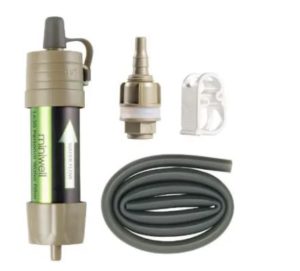
The Miniwell is a portable gravity filter that can filter up to 2000 liters of water. This gravity water filter eliminates the need for bottled water and gives a far more convenient, space-saving, and lightweight alternative for hiking, fishing, camping, vacation, or simply storing in the car for emergency use.
The Miniwell has a flow rate of 600 ml per minute and 0.1 ultrafiltration membranes, allowing you to get clean water faster. You can use the straw to fill many drinking cups for your family or attach it to your own water bottle for personal usage. Backwashing the filter on a regular basis might extend its life.
The Miniwell does not come with its own bag or container, which provides you more options for what you can do with it. Attaching it to a throwaway plastic bag is one alternative for making your own DIY filtering systems. You could also attach the Miniwell to a bucket for a more substantial, long-lasting version of the same idea.
There isn’t much information about what the Miniwell filters out of water, but it’s intended for use on spring water that isn’t overly contaminated. According to users, the filter does not perform well on water with a high sediment level, but it is excellent at eliminating germs and other microbes from natural water sources.
10. Katadyn BeFree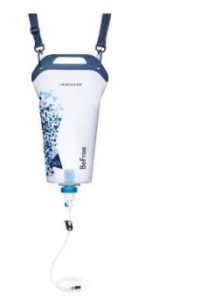
The Katadyn is a 0.1 micron fast-flow gravity water filter that hangs from the ceiling. This filter, which costs somewhat more than the usual price of a hanging water filter, has a more robust design and construction that is meant to offer you more overall use out of the gravity water filtration system.
To filter water on the move, simply fill the Katadyn flask with water and let gravity do the rest. Water will pass through the filter membrane, which will remove pollutants and organisms such as more than 99.9% of bacteria and 99.9% of protozoa. To get more usage out of the filter, fill the flask with water, attach the cover, and shake it to clear the debris – no backwashing required.
The Katadyn system incorporates a foldable flask that allows it to fit into small locations such as backpacks or coat pockets. It’s a terrific item to have on hand whether trekking or camping, whether alone or with others, because it’s made of lightweight nylon. It is powerful enough to be used on hazy, sediment-filled water and has a capacity of up to 1000 L, depending on water quality.
The Katadyn is made entirely of BPA-free materials, and no chemicals are utilized to filter the water. Because the water filtration system has a pretty fast flow rate, you won’t have to wait for hours for a drink when you’re thirsty.
Buyer’s Guide For The Best Backpacking Gravity Water Filter
What is a gravity water filter?
Gravity water filters do not use water pressure to force water through the filter. Instead, they employ gravity – hence the name – to filter water gently and progressively remove impurities. This frequently means that a gravity fed water filter may do a considerably more complete job of filtering water by exposing it to filter material for a longer period of time.
How does a gravity water filter work?
A gravity filter is typically composed of two chambers that are stacked one on top of the other. Pour water into the upper filter, and the water flows through a filter into the lower chamber using just gravity’s pushing force. In most cases, the lower chamber contains a little dispenser that may be turned on to release clean water into a drinking glass.
Types of gravity water filter systems
Gravity fed water filter systems are classified into two types: countertop and hanging. The primary distinctions between them are discussed further below.
Countertop
A countertop gravity fed water filter is often made of stainless steel and sits on a surface, such as a kitchen countertop. The best countertop gravity water filters are available in a variety of sizes, with bigger filters capable of purifying several gallons of water at once.
Hanging
Hanging gravity water filters operate on the same principle as tabletop filters, but are intended to be hung at a greater height. They are often much smaller than countertop water filters and resemble hospital IV bags – however they are far more innocent!
While on a trek or camping trip, you can fill a hanging gravity filter with water from a lake or stream, and it will utilize gravity to filter the water as it flows down the tube towards the cap you drink from. They are far less expensive than countertop gravity filters, but they are not intended for daily use and are often less lasting due to the materials used.
Advantages & Disadvantages of Gravity Water Filtration System
Advantages
Can be used in an emergency
The fact that a gravity filter does not require electricity to operate is perhaps its most appealing feature. You don’t even have to connect it to a water line – as long as you have a water supply, you’ll have a reserve of clean water to drink from. If your home ever lost power or running water, you’d still have your water filter to drink from.
Simple installation
A gravity water filter requires little to no installation. All that is necessary is some basic assembly of the many components that comprise the gravity water filtration system. Some filters must be primed before use, which involves putting a batch of water through them to remove any residual tastes or odors, although this only takes a few minutes. Installing a gravity water filter takes far less time than installing a filter that must be linked to a water line.
Low maintenance
All you need to do with a gravity water filter is change the filter. When your filters need to be changed, it will take twice as long for your water to be ready for drinking. The gravity water filtration system only requires you to change the filters every 6 to 12 months, making this type of maintenance infrequent.
You should also clean your gravity water filter on a regular basis, but this is usually quick and easy because most filters are constructed of stainless steel.
Various sizes for various purposes
Gravity water filters come in a variety of sizes, ranging from huge countertop units for large households to smaller units and portable systems that can be used on the go. When looking for gravity water filters, you don’t have to make compromises – you may choose the gravity water filtration system that best meets your needs.
Disadvantages
Slower than water line filters
Because gravity water filters filter water using gravity rather than the force of water pressure, the filtering process takes longer. In most circumstances, a gravity water filtration system will only take a few minutes to filter water, although it isn’t as quick as a filter linked to your water line. A gravity water filter will not provide you with fast access to drinking water.
Needs to be cleaned regularly
Although cleaning a gravity water filter is quick and easy, it must be done on a regular basis to prevent recontamination. If you are unwilling to devote time to cleaning your gravity water filtration system, it is most likely not the ideal one for you.
Takes some manual work
To acquire filtered water from your gravity water filter, you must first fill it with unfiltered water. When your water runs out, you’ll have to refill it. It’s not a lot of labor, but if you have mobility limitations, you can have trouble filling your filter.
6 Considerations For Buying the Best Gravity Water Purifier
Filter media & lifespan
The majority of gravity filters have a lifespan of 6 to 12 months. Filter media is commonly constructed from activated carbon, coconut shell carbon, or a similar substance.
In terms of effectiveness, activated carbon media is one of the most used filter materials and has a well-proven scientific procedure. A hanging gravity water filter has an average lifespan of 500 gallons, so you’ll need to replace it more frequently, typically every 1 to 2 months, depending on use.
Contaminants removed
Most gravity water filters remove the bare minimum of chlorine from water. There are several filtering devices that can remove microorganisms, heavy metals, and pollutants such as pesticides and herbicides. Some gravity fed filters can even soften water and add beneficial minerals, although this is not a standard function.
Flow rate
Gravity water filters, by definition, have a slower flow rate than other types of water filters. It takes them longer to filter water for drinking since there is no pressure from a plumbing system forcing the water along. A gravity water filter will take approximately 7 hours to filter between 4 and 7 gallons, depending on the amount of filters included.
Portability
Hanging gravity water filters are far more portable than tabletop water filters by design. They’re small and compact, and because they have a bagged reservoir, you can shape them to fit into a space in your backpack. When they’re empty and not in use, simply fold them up and store them.
Countertop filters are still portable, but not to the extent that hanging filters are. You can disassemble them and stack the components inside one another to conserve space, but you’ll still need a lot of space to store and transport them.
Storage Capacity
While the fact that a hanging gravity water filter is tiny and portable is a plus, it also means that this form of filter has a lower capacity. The majority of hanging filters have a 1 gallon capacity. Some countertop water filters, on the other hand, can hold up to 5 gallons of water, but these considerably larger machines are obviously not suitable for taking about in your bag on a camping trip. If you intend to use your water filter just at home, a countertop gravity filter is the ideal option. A hanging water filter is better suitable for taking with you on camping vacations.
Chamber material
Stainless steel is the most frequent chamber material for a countertop water filter. This substance helps to keep water fresher for longer by preventing corrosion.
Plastic and silicone are common materials used to make hanging gravity water filters. When it comes to plastic, it’s important to ensure that the product is made of food-grade, BPA-free materials, which most hanging water filters are.
Conclusion: Which Is The Best Gravity Water Filters?
When you don’t have access to filtered faucets or home filtration systems, gravity-fed water filter devices can help you acquire filtered water. We put a lot of different gravity filters through their paces in order to find the finest ones. You’ve already read our reviews comparing seven of our favorites, but we’ll mention them again to keep them fresh in your mind.
The Platypus GravityWorks Water Filter System is our top pick. The big four-liter clean and dirty water reservoirs, the outstanding 1.75 liters per minute flow rate, and the 1,500 gallons of water we could filter between cartridge replacements all impressed us.
We believe the Katadyn BeFree Filtration System is the finest value for money. It rattles cleanly, eliminating the need for backflushing, and filters at a rate of two liters per minute. It is extremely adaptable, as it may be used in a variety of ways without the necessity of hoses or other bags.
The Travel Berkey is our top selection for a quality filter that even destroys viruses. Its filters eliminate viruses, drugs, bacteria, protozoa, and other contaminants, and they last for 6,000 gallons before needing to be replaced.
Frequently Asked Questions (FAQs)
Will a gravity water filter soften water?
No, 9 times out of 10. If a filter achieves this – and there are a few that do – it will be promoted as one of its key features. The majority of gravity water filters, like other water filters, simply remove pollutants from water. If you want to eliminate limescale, you need to invest in a specialised water softener.
Which is best, a hanging water filter or a countertop water filter?
Neither is superior than the other, but you may discover that one type of gravity water filter is better suited to your requirements. Consider whether you will use your filter more at home or on vacations away. Countertop water filters are the more practical solution for at-home use. Hanging water filters make a lot more sense for trips away.
How do you know when to change your filters?
The filtration process should slow down to the point that it may take twice or three times as long to filter your water as usual. You may also notice a difference in the flavor of your water.
Why is it important to change the filters?
When your filters cease working, it is effectively pointless to use them to purify your water because they will not do their job adequately. If you filter river water, changing your filters and making sure they’re in good operating order will help you stay healthy.
How often should you clean your Gravity water filter?
As for the countertop Gravity water filter, it requires to be clean thoroughly every 2-3 months once. However, if your water system experiences high level of minerals and its deposits may be accumulated in the holding tank over time then it is best to deep clean your water system more often. As for the hanging gravity water filters, always wash every components properly and remember to dry the parts as per the manual guide given to preserve the lifespan of the water system.
How do you store your Gravity water filter?
If you’ve decided to be away or just decided not to use your Gravity water filter then simply pour away any remaining water from your gravity water filter and remove any filters. Then, allow the filters to air dry and store them in a clean and cool environment away from direct sunlight until you planned on using your gravity water filter again.